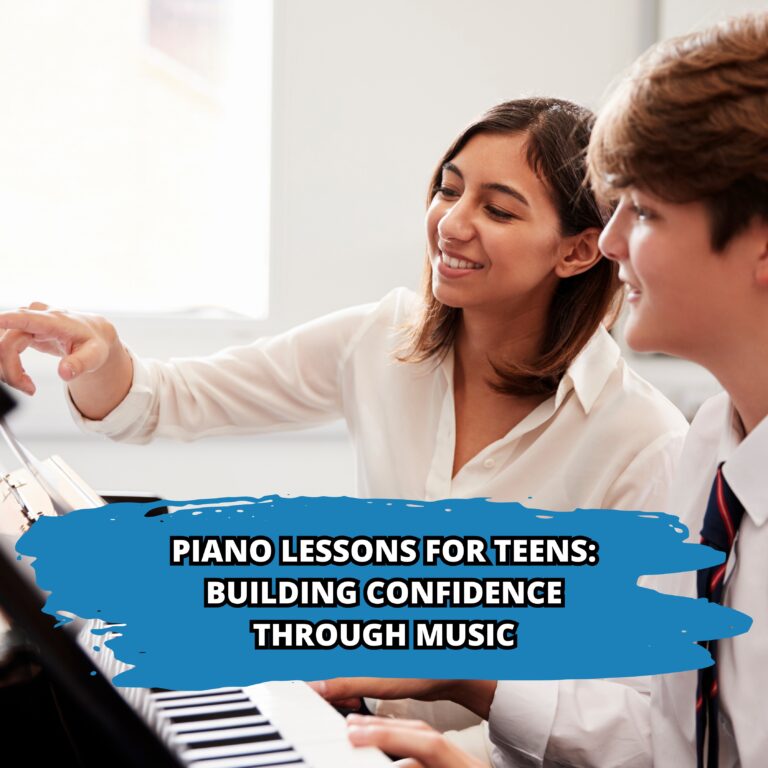Piano Lessons for Teens: Building Confidence Through Music

The Importance of Music in Teenage Development
Music plays a vital role in teenage development by shaping their emotional and cognitive growth. Playing an instrument like the piano enhances coordination and multitasking abilities, which are essential for academic and personal success. Music engages multiple areas of the brain, fostering better memory retention and improved problem-solving skills. Teens who participate in music lessons often develop a stronger sense of self-discipline, which translates into other areas of their lives.
How Music Affects Teen Brain Development
Learning the piano engages the brain in complex ways, stimulating regions involved in both logic and creativity. This dual stimulation supports cognitive flexibility, allowing teens to think outside the box and approach challenges from multiple angles. Piano lessons for teens can enhance their executive functions, such as planning and impulse control, which are essential during adolescence. These benefits can lead to improved academic performance and the ability to manage stress more effectively.
Emotional and Social Benefits of Playing an Instrument
Piano lessons for teens help them express their emotions in a healthy and constructive way. Music acts as an emotional outlet, allowing teenagers to process their feelings and build resilience. Socially, participating in music lessons or group activities fosters a sense of belonging and collaboration. Playing an instrument can also improve a teen’s self-esteem by providing a tangible skill they can be proud of and share with others.
Why Piano Lessons Are Ideal for Building Confidence
Piano lessons are uniquely suited for building confidence in teens due to the balance of challenge and achievement they provide. Learning to play the piano requires consistent effort and the willingness to face and overcome mistakes. Each small success, whether mastering a new piece or improving a difficult section, reinforces the teen’s belief in their abilities. This continuous cycle of goal-setting and accomplishment helps build a strong sense of self-confidence.
The Balance of Challenge and Achievement
Piano lessons for teens present a balanced approach that encourages them to step outside their comfort zone while celebrating each milestone. The structured progression of learning from simple melodies to complex pieces teaches teens to tackle challenges incrementally. This gradual approach boosts their confidence and builds resilience as they realize that hard work yields results. Teens learn to trust in their capabilities, which positively impacts other areas of their lives.
The Role of Performance Opportunities
Performance opportunities, whether in front of family, peers, or at recitals, play an essential role in confidence building. When teens perform, they learn to manage nerves and present themselves publicly, skills that are valuable throughout life. Performing also reinforces their sense of accomplishment and boosts their self-esteem as they share their hard work with others. Elite Music Academy, for example, provides regular recitals that help teens gain experience and pride in their progress.
Overcoming Challenges in Learning the Piano
Learning any new skill comes with its set of challenges, and piano lessons are no exception. Teens may face initial hurdles such as learning to read music or perfecting hand coordination. These challenges teach patience and perseverance, traits that are valuable throughout life. When teens overcome these obstacles, they gain confidence in their ability to conquer difficulties.
Managing Stage Fright and Performance Anxiety
Stage fright is a common experience for teens, but it can be managed effectively through piano lessons. Regular exposure to performance environments helps teens become familiar with the feeling of nervousness and teaches them to channel it positively. With practice, teens learn deep breathing techniques and focus exercises that help them manage anxiety. Overcoming stage fright through repeated experiences builds a teen’s confidence, making them more comfortable in various public and social settings.
Building Patience and Perseverance Through Practice
Piano lessons for teens emphasize that progress takes time, which encourages patience. Learning to play a new piece or mastering a difficult part requires repeated practice, teaching teens the value of persistence. Overcoming these musical challenges helps them develop perseverance, which becomes a transferable skill. This patience-building process reinforces their belief in their abilities to face challenges both in and out of music.
How Parents Can Support Their Teen’s Musical Journey
Parents play a crucial role in supporting their teen’s musical journey and enhancing their confidence. Encouragement, patience, and practical support can make a significant difference in a teen’s progress. Simple acts like showing interest in their practice sessions and attending their performances can boost their morale. Ensuring that teens have the tools and environment they need to practice consistently also shows parental support.
Encouraging Consistent Practice Without Pressure
Teens are more likely to enjoy and benefit from piano lessons if they do not feel pressured to be perfect. Parents can encourage consistent practice by making it part of a balanced schedule rather than an obligation. Positive reinforcement helps teens view practice as an enjoyable and rewarding activity. By celebrating small wins, parents help teens build a positive relationship with their musical development.
Celebrating Progress and Small Achievements
Acknowledging milestones, no matter how small, can motivate teens to keep learning. Parents can make a habit of celebrating new pieces learned, improvements in technique, or successful performances. Praising effort rather than just results teaches teens that dedication is more important than immediate success. These celebrations can strengthen their confidence and willingness to face future challenges.
The Role of Music Academies in Teen Development
Music academies offer structured, supportive environments that enhance teens’ learning experiences. At Elite Music Academy, for example, students receive personalized attention that caters to their learning styles and goals. This tailored approach helps teens develop their musical talents while fostering their self-confidence. Learning in an academy setting also provides a sense of community where teens can build relationships with peers who share similar interests.
How Elite Music Academy Nurtures Confidence and Skill
Elite Music Academy offers comprehensive programs that combine individual lessons with group activities, giving teens opportunities to perform and collaborate. This balance between solo practice and group engagement builds social skills and confidence. Instructors at the academy are experienced in mentoring students through their musical journey and provide constructive feedback that encourages growth. Teens are empowered to embrace their unique strengths and develop their musical voices.
Benefits of Learning in a Structured, Supportive Environment
A structured learning environment ensures that teens have a consistent routine and clear objectives. This structure helps them set and achieve goals, which can contribute to their sense of accomplishment. Music academies like Elite Music Academy provide a supportive atmosphere where instructors and peers motivate students to improve. Such an environment allows teens to thrive and build the confidence they need to tackle challenges beyond music.
Additional Benefits Beyond Confidence
Learning to play the piano has benefits that extend beyond confidence building. Piano lessons can improve a teen’s focus and academic performance by fostering discipline and enhancing their cognitive skills. Music education has been linked to better concentration, memory, and overall academic outcomes. Additionally, playing the piano can strengthen a teen’s social skills by giving them opportunities to interact with other musicians.
Improved Focus and Academic Performance
Piano lessons for teens require attention to detail and sustained concentration. This practice can translate into better focus during schoolwork and exams. The process of reading music and translating it into hand movements trains the brain to process information quickly and accurately. These skills support academic achievement and help teens manage their study habits more effectively.
Enhanced Social Interaction and Teamwork Skills
Participating in music lessons often involves ensemble playing or group recitals, which develop teamwork and communication skills. Teens learn to listen to others, synchronize with group members, and contribute to a shared musical goal. These collaborative experiences help build friendships and teach teens how to work within a team, preparing them for social and professional interactions in the future.
Empowering Teens Through the Power of Music
Piano lessons for teens offer more than just musical knowledge; they provide life skills that build confidence, resilience, and academic performance. Structured learning environments, such as those provided by Elite Music Academy, create the perfect foundation for personal growth. The journey from learning simple notes to performing complex pieces helps teens realize their potential and builds a sense of achievement that impacts all areas of life.
FAQ
Q: What are the main benefits of piano lessons for teens?
A: Piano lessons for teens build confidence, enhance academic performance, and develop perseverance. They also improve social skills through collaborative activities and provide a healthy emotional outlet.
Q: How do piano lessons help build confidence in teenagers?
A: Piano lessons offer a balance of challenge and achievement, teaching teens to overcome obstacles and celebrate their progress. Performing for others and receiving positive feedback reinforces their self-esteem.
Q: Why is performance important in piano lessons for teens?
A: Performance opportunities help teens manage stage fright and develop public presentation skills. Performing builds confidence and allows teens to showcase their hard work and dedication.
Q: What role do parents play in supporting their teen’s piano journey?
A: Parents can support their teen by encouraging practice without pressure, celebrating progress, and showing interest in their musical activities. This support helps teens stay motivated and feel valued.
Q: How do piano lessons improve a teen’s focus?
A: Piano lessons enhance a teen’s focus by training them to concentrate on reading music and coordinating hand movements. This sustained attention improves their ability to focus on academic tasks and daily activities.


